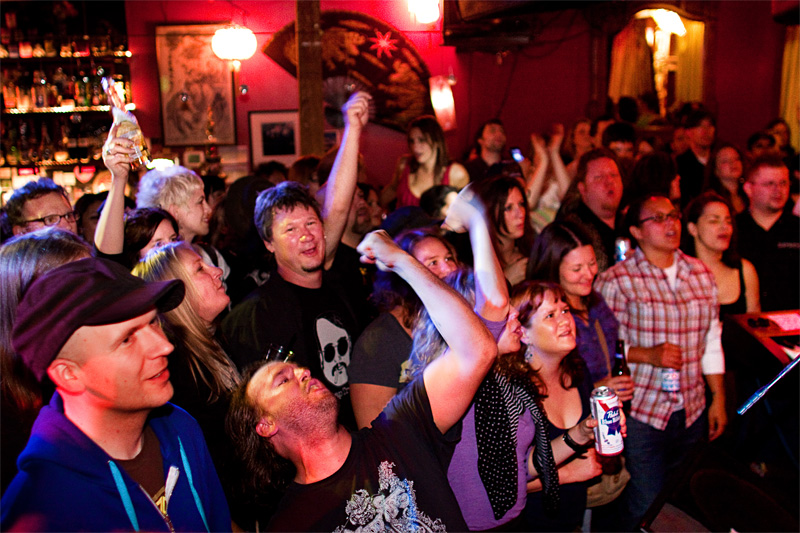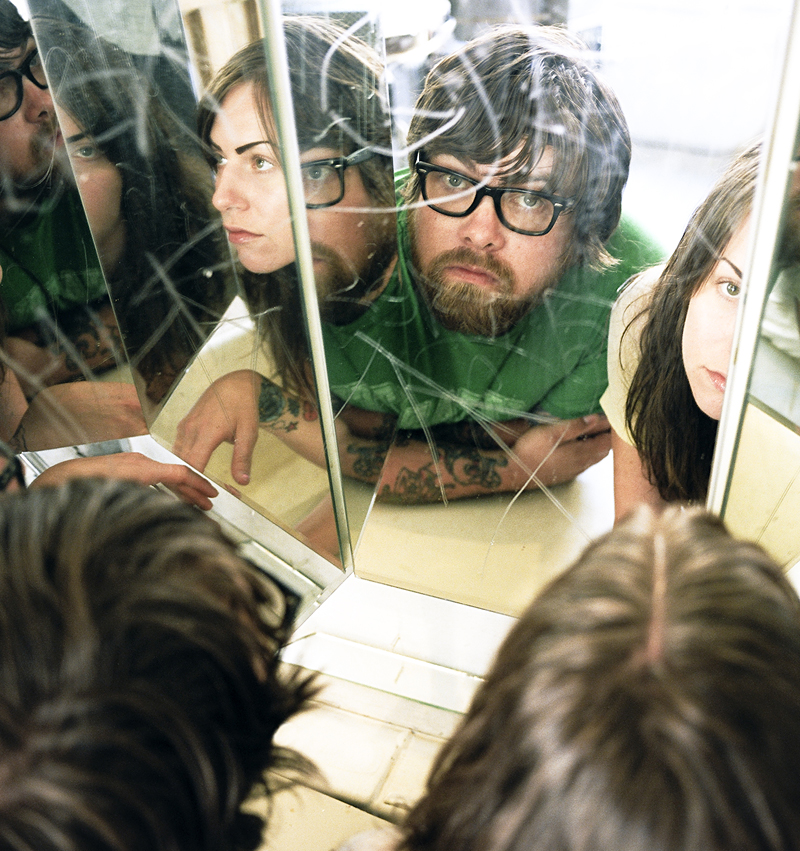Those who attended (or heard about) the Catheters’ final show at the Sunset Tavern probably never expected the defunct Seattle punk band to reunite for the Sunset’s 10th-anniversary blowout. “The last time we played there, which was our last show, Davey [Brozowski] and Leo [Gebhardt] got in a fistfight,” Catheters frontman Brian Standeford recalls. “It was gnarly. Davey was planning to trash his drums at the end of the set and Leo got started without him. And that really pissed Davey off, so he jumped over the kit and just started whaling on him.”
The Catheters, a band formed in high school by Standeford, original bassist Paul Waude, original drummer James Lysons, and guitarist Derek Mason, signed with Sub Pop and released two full-length albums before splitting up, with Gebhardt and Brozowski eventually replacing Waude and Lysons.
Standeford, Brozowski, and Gebhardt had been planning to start a post-Catheters band, but the fight “sort of put the kibosh on that for a while,” Standeford recalls. “Davey had a broken hand, and Leo was understandably really pissed off. It had been brewing for a while between those two.”
After the brawl, a Catheters reunion seemed unthinkable to Standeford. But six years after the unfortunate drum-destruction incident, the band decided to try a reunion show at the behest of Sunset booker Mike Jaworski. “We’ve always loved the Sunset,” Standeford says. “It was probably our favorite place to play in town while we were a band.”
Though Ballard Avenue is now one of the first streets in Seattle that come to mind as a live-music hotspot—the Sunset Tavern, the Tractor Tavern, and folk venue Conor Byrne are all located within blocks of each other on the same street—the neighborhood wasn’t always known as a destination for live music (or much of anything else). When the Tractor first opened 15 years ago, owner Dan Cowan struggled to draw crowds to Ballard for the rockabilly, folk, and bluegrass bands that dominated its schedule. While the Backstage, a now-defunct music venue on Market Street, was well-established, Ballard Avenue was a maze of empty storefronts and dive bars populated chiefly by fisherfolk, punctuated by Ballard institution Hattie’s Hat, an eatery that once employed a young Neko Case.
“Ballard Avenue at that point was completely unknown,” Cowan recalls. “People couldn’t find it. They’d drive along Leary and they’d drive right past it. There was some press and agents [who] would say ‘God, all the way in Ballard?’ And people in Capitol Hill would be complaining about how long a drive it was.”
When the alt-country movement took off, so did the Tractor. Still, he says, “it was a slow growth. It took about three or four years before we really filled the place up on a regular basis, and even then it took another full 10 years to really hit our stride.”
When Sunset Tavern owner Max Genereaux bought the venue, with Cowan’s encouragement, he maintains that Ballard was ripe for development—it was just a question of what kind. Before he purchased the Sunset, it was “an old, divey fisherman bar,” he recalls. “As was Hattie’s [of which he is now also an owner]. As was pretty much everything on Ballard Ave. back in those days.” Furthermore, Genereaux says, “The fishing industry is a shrinking industry. So there was gonna be something else going on in Ballard other than fisherman bars. The other thing going on in Ballard is [that] the average age of a Ballard resident has dropped substantially in the last 15 years.”
Not only that, but the Sunset filled a need that wasn’t being met in other neighborhoods. “At the time [it opened], there weren’t a ton of places like [the Sunset],” Standeford says. “The Break Room kinda switched over to Chop Suey, which initially was doing more hip-hop nights and things like that. And the Sit and Spin was kind of on its way out at that point, so in terms of venues in the city, there weren’t a lot of venues that size.”
Ten years after the Sunset’s grand opening in June 2000, playing there has become a rite of passage for up-and-coming local bands. The Catheters are just one example. Currently, all its members play in other, well-respected local projects: Standeford started a new rock-and-roll band, Idle Times; Mason plays keyboards in the Girls; Gebhardt has a solo folk project; and Brozowski fronts indie-pop outfit the Black Whales.
Because of the younger demographic, Ballard Avenue—and the Sunset—has become one of Seattle’s premier destinations for live music. But making it happen was a challenge. After two years of booking largely local bands like the Model Rockets (who will reunite for the Sunset’s anniversary celebration) and offering regular weekly events like Monday blues nights, Genereaux passed booking duties to local music-scene stalwarts Kwab Copeland and Drew Church (whose band the Cops is also reuniting for the celebration). Copeland recalls it was difficult at first to be taken seriously. “I remember one particular booking agent laughing in my face,” Copeland says. “She thought I was booking the Sunset Bowl. We also used to e-mail bus schedules to music writers.”
If the Sunset played a role in Ballard’s reverse-aging process, it was likely because the Sunset’s roster of rock and pop bands—including nationally renowned artists like Of Montreal, Joanna Newsom, Camper van Beethoven, Cordero, and Jesse Sykes—helped lure young people to Ballard.
“At first we tended to get a reputation as bringing in a younger crowd than our big sister the Tractor, although we worked in conjunction with the Tractor a lot of the time,” Copeland says. “I think the Sunset has a lot less to do with the formation of the new Ballard than King’s [Hardware], the Matador, BalMar, etc., but we did help make it a destination neighborhood for music.”
Currently, Cops frontman and Mt. Fuji Records head Jaworski books the Sunset full-time. “Kwab, Drew, and Mike far exceeded my expectations of what I thought the club would be,” Genereaux says. “I thought it would just be a local music venue.”






